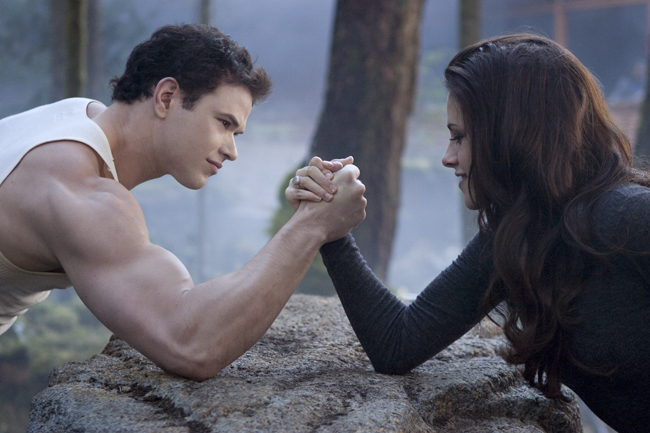“Twilight” is the kind of franchise whose success simultaneously makes zero sense and all the sense in the world. It’s an exercise in horrible, horrible writing and characterization, but just the right combination of the horror zeitgeist and blatant wish fulfillment. Thankfully, “Breaking Dawn – Part 2” is the last audiences will have to endure of Bella and Edward, and it manages to be just as weak as the earlier films.
The finale picks up right where the last “Twilight” left off. Bella (Kristen Stewart) is a vampire, turned to keep from dying after Edward (Robert Pattinson) gnawed their child out of her uterus. That child, Renesmee (Mackenzie Foy), is an unprecedented combination of vampire and human, and draws the attention of the nefarious Volturi. Led by Michael Sheen’s Aro, the Volturi decide to attack Edward and his family, but conveniently give the heroes enough time to assemble a team of vampires to fight alongside them, each of them with different superpowers.
“Breaking Dawn’s” listless opening scenes deal with Bella learning how to become a vampire, and every other character incessantly praising her abilities right off the bat, including her superpower, which apparently makes her impervious to other vampires’ superpowers. (And why do vampires need superpowers anyway?) Even so, if Stewart could bring some sort of conviction to her role, you might begin to root for her. However, there’s no weight to her, no inner turmoil about the fact that she’s technically the undead, and while there’s nary a hair-flip or lip-bite to be found, Stewart hasn’t really developed as an actress over the course of these five films. In the right role, she can be effective and even charming, but here, she’s content to stare blankly at things and occasionally toss a little emotion into her line delivery. Even when she’s freshly turned and thirsting for blood, there’s not much to her performance, and Stewart’s shift into predator mode is one of the least convincing parts of “Breaking Dawn.”
If there’s one thing you can count on from a “Twilight” movie, it’s unintentional laughs, and those come fast and easy from the film’s two romantic leads, Pattinson and Taylor Lautner. Lautner plays Jacob, a werewolf who was once Edward’s competition for Bella’s heart but who has fallen in love at first sight with their infant daughter instead. Besides the inherent ickiness to this plot point, Jacob and Edward have never been particularly compelling characters, being bland love interests on different sides of the same boring spectrum. Thankfully, both of the actors portraying them manage to give some of the worst acting in the franchise, and several of the best moments in “Breaking Dawn” come when Lautner and Pattinson are struggling to sputter out credible dramatic dialogue.
Bill Condon was brought on to direct this two-part conclusion to the series, and he does the best he can with the material. “Breaking Dawn” is always competently made, and the franchise has managed to assemble a strong roster of supporting players. There are even some striking moments in the film, often involving the natural beauty of its locations, but no matter how good “Breaking Dawn” may look, the story of the film is so tepid (and the underlying themes so strange) that it’s never more than a visually lush picture whose inhabitants are impossible to care about.
But the most baffling and frustrating thing about “Breaking Dawn” is its climax. For about 10 minutes, the film becomes undeniably entertaining. It wracks up a body count of memorable characters, boasting some of the series’ most impressive effects and a hilarious number of bloodless decapitations to boot. It’s a rare moment where you’re actually almost invested in what’s happening, and for the first time, there are actual stakes. Then, in one fowl swoop, “Breaking Dawn” undoes all that goodwill and what’s meant to serve as the film’s climax. It’s a toothless move that sends the film from typical to terrible.
While it was inevitable that “Breaking Dawn” would have a happy ending, what audiences get is barely an ending. Sure, things wrap up with a cavity-inducing montage of Edward and Bella clips that’s better suited to Youtube, but there’s no sense of the characters having overcome anything, having changed in any way. The series has always had a tendency to set up dramatic stakes and then betray them as soon as it looks like things won’t turn out well for the characters, and there’s no real struggle in “Breaking Dawn,” no consequences or sense of peril, making for a dramatically disappointing experience.
In the end, it’s hard not to get the sense that “Breaking Dawn” didn’t need to be two movies. The pacing is a mess, an unsatisfying meander that rarely moves with purpose or energy, and once the film finally picks up in the third act, it throws that momentum back in the audience’s face with a scoff. True, grizzled film critics probably aren’t the target audience for this particular franchise, but it’s hard to deny that these films have boasted some of the most horrendous acting in blockbuster history, flat, uninspired storytelling and lots of unintentionally uproarious moments. “Breaking Dawn” is a fitting, inconsequential end to a franchise built on wish fulfillment. But thankfully, it’s just that — the end.





















